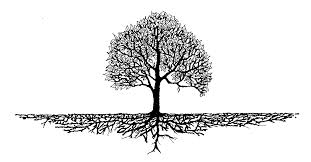In the previous post: Antidepressants vs Meditation: Healing the Symptom and Root Cause of Unhappiness, we began looking at the roots of mental illness and mental health. As a culture we know the “branches” or symptoms of mental illness very well, anxiety, depression, addictions, obsessions and so forth; but we have difficulty looking at the “roots” of mental illness. Generally speaking, I observe that the root of mental illness, is in fact, a loss of rootedness; rooted to ones self, rooted with families and ancestors, rooted with nature and rooted in the need to help others, where we can. People generally lose the feeling of this root and it’s essential cure for mental illness. Whether it is a minor parenting or marriage problem, or the problems caused by abuse and trauma, losing the root is the main problem.
 Dalai Lama (Nobel Peace Prize), The Path to Enlightenment, p.38
“When we look for the source of all the problems that confront human life we usually blame everything but the root cause: our lack of spiritual discipline and realization. Particularly in this degenerate age, the world atmosphere is so very negative and the conditions around us conducive to little but evil karma and meaningless distractions, that not to have the protection of spiritual knowledge is to leave ourselves totally defenseless against the negative mind.”
Dalai Lama (Nobel Peace Prize), The Path to Enlightenment, p.38
“When we look for the source of all the problems that confront human life we usually blame everything but the root cause: our lack of spiritual discipline and realization. Particularly in this degenerate age, the world atmosphere is so very negative and the conditions around us conducive to little but evil karma and meaningless distractions, that not to have the protection of spiritual knowledge is to leave ourselves totally defenseless against the negative mind.”
When is it medicine and when is it poison?
The evolution of our culture in medicine and science has made great strides, but the root of mental illness has been left unexamined to a great degree. Some say we are just biology. Chemicals acting and reacting. Change the chemistry, change the person. We especially appreciate modern medicine when we have dental work done or we are overwhelmed with depression or anxiety. Drugs and alcohol have their place; amount, amount, amount.
I have seen many of my patients start on the correct antidepressant and at the right dosage. It helped them stabilize in the therapy process. Then, when they had worked through enough of their struggle, the medication could be gradually reduced and maybe dropped off. It was no longer necessary, they had stabilized, “rooted themselves”. We are more than biological machines to fix and get out on the road again. We cannot keep trying to adapt to the sick parts of modern culture that says “go, go, go, be better, get more, not good enough”.
What to do?
- Acknowledge we have an inner life, to push it away and “just get over it” doesn’t work. We must learn how to relate to our inner life, with it’s emotions, feelings, dreams, struggles, intuitions and so forth.
- Learn about the inner life in any way that works for you; for example, from a therapist you trust, nature, classes that deal with inner work, stress reduction, or spirituality.
- Meditate or in other words (be present to what is).
- Read books that feed your soul.
Candace Pert, Ph.D. Molecules of Emotion: The Science Behind Mind-Body Medicine“: The tendency to ignore our emotions is “oldthink”, a remnant of the still-reigning paradigm that keeps us focused on the material level of health, the physicality of it. But the emotions are a key element in self-care because they allow us to enter into the body-mind’s conversation. By getting in touch with our emotions, both by listening to them and by directing them through the psychosomatic network, we gain access to the healing wisdom that is everyone’s natural biological right.”
Learning and then doing
Getting to know our emotional inner life takes some learning, but this learning has immediate results. I taught a Mind/Body Medicine course for Kaiser Hospital for a long time. After the first meditation instruction in the first class, almost all of the people felt a sense of greater calmness. The problem that remained was doing it regularly. So I handed out little round stickers to place by the phone, dashboard of the car, and other places where people get stressed, to remind them to feel their breathing. One women asked, “Could I put one on my husband’s forehead?”
As we learn the psychology of the inner world, it becomes less threatening, but we need some maps and a guide. I had a client say to me once that I was like a friend going into a scary neighborhood with him. I was able to show him how to navigate better, and how to relate with parts of himself that were fearful. This process kept his suffering minimized, so he could mature from the difficulty rather than being repeatedly devoured by it.
C.G. Jung: “What the doctor fails to see in himself, he will either not see at all in his patient, or see grossly exaggerated.” http://www.innerwork.info/quotes.htm
